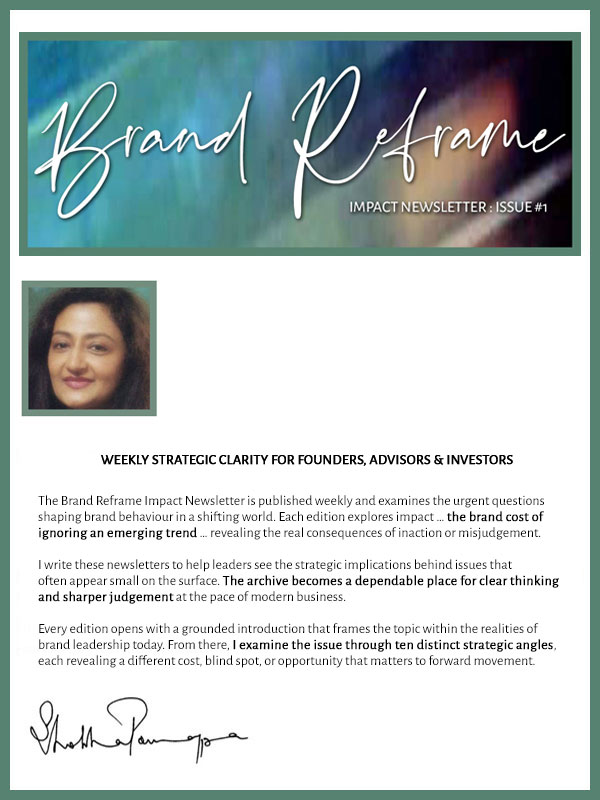
FOCUS: BRAND STRATEGY MISFIRES | AUDIENCE: STEWARDS OF PLATEAUED BRANDS
BY: SHOBHA PONNAPPA | BRAND BREAKTHROUGH STRATEGIST | 45 YEARS | 125+ CLIENTS
I answer 6 tough questions about why brand refresh efforts often end up confusing audiences instead of clarifying.
I often meet brand stewards who initiate a refresh … thinking a new logo or tagline will spark new growth. After the reveal, however, customers hesitate instead of reconnecting. They ask, “Has the brand changed ownership?” or “Is this still for me?” That confusion signals a lack of strategic grounding. A brand refresh must clarify continuity, not disrupt recognition.
A refresh confuses when it focuses on aesthetic upgrades without revisiting the strategic why. Leaders often say, “We just need to look modern,” forgetting that a brand’s strength lies in its message consistency. When visuals change without re-anchoring meaning, loyal customers feel lost. Change without clarity can alienate your best advocates.
Even subtle visual tweaks can disrupt deep-seated recognition patterns. If tone, colour, and symbolism shift too sharply, the emotional trust built over years weakens. Customers may not reject the new identity outright, but engagement drops. The key is evolution, not reinvention. Familiarity is a bridge to credibility … not a limitation.
You’ll often notice internal dissonance before customers articulate it. Teams begin debating messaging inconsistencies, and sales materials lose cohesion. Social posts sound upbeat but lack substance. These subtle fractures indicate that your new direction hasn’t integrated with your existing story. Internal confusion is the first external symptom.
Externally, watch for disengagement metrics. When your followers stop interacting or loyal clients hesitate to renew, something has shifted beneath the surface. The refreshed look might appear sleek, but it no longer feels like “you.” Brand misalignment always shows up first in emotional response.
It’s tempting to believe that design changes can spark perception change quickly. Visual upgrades feel tangible and exciting, especially under pressure to “look current.” But without strategic introspection, that speed comes at the cost of coherence. Surface-level shifts rarely fix underlying stagnation.
In my work with plateaued brands, I’ve found that the strongest refreshes start with narrative clarity, not colour palettes. They revisit the original promise, then evolve the story visually around that truth. The refresh then feels organic rather than imposed. True renewal begins within the brand’s DNA.
Start by framing your refresh as a continuation rather than a departure. Communicate that the essence of the brand remains constant. Involve long-term customers early … test visuals and messages before launch. Transparency builds anticipation and trust. Clarity in intent leads to loyalty in perception.
Internally, train every communicator … from marketing to sales … on the “why” behind the new look. The external shift should mirror internal conviction. If your team can’t articulate the refresh rationale in one sentence, customers won’t get it either. Consistency across channels keeps the story intact.
It blends respect for the past with readiness for the future. Visuals feel recognisable yet energised. Taglines evolve tone without losing core meaning. Every new asset tells the same bigger story: the brand’s next chapter, not a new book. A good refresh feels like coming home to something newly alive.
Strategically, successful refreshes emerge from insight, not impulse. They begin with audits of perception, performance, and positioning. When the refresh aligns these three, it reignites relevance seamlessly. Alignment transforms cosmetic change into competitive advantage.
You’ll sense it when audiences no longer “see” your brand even though you’re visible. Familiarity turns into invisibility when differentiation fades. If your competitors now sound like you … or worse, look like you … it’s time to evolve your identity. Stagnation disguised as stability is the danger zone.
But refreshes shouldn’t happen out of fatigue or fashion. They should follow clear inflection points: new leadership, market expansion, or audience evolution. Ask yourself if your current identity limits opportunity. If yes, move forward strategically. A thoughtful refresh reconnects vision with voice.
If your audience seems uncertain after your refresh, don’t panic. Step back and audit the shift through your customer’s eyes. Realign the story before tweaking visuals again. In most cases, clarity can be restored without a full reversal. Strategic recalibration always trumps aesthetic reaction.
If you’re an investor seeking momentum for your portfolio brands, this FAQ Insight Post I wrote could interest you: “FAQs: When Founders Confuse Brand Feel with Brand Fit.“
And if you’re a solo expert looking to sharpen traction, this FAQ Insight Post I worked on may resonate: “FAQs: When Market Perception and Brand Truth Strongly Differ.“

"One BIG IDEA can turn brand stagnation into unstoppable movement. Spots are limited each week ... book your breakthrough session now."
Shobha Ponnappa
More Breakthrough Ideas … Case Studies & FAQs … from the Brand Strategy Misfires Category
Case Studies
FAQ Insights
Download the 14-case collection and receive weekly insights to strengthen your strategic judgement.
Get my free Case Studies Compendium. Real transformations, clear strategic shifts, and practical ways brands regain traction.

You’ll also get my fortnightly Brand Reframe newsletter. with smart insights, distilled thinking, and focused ideas to help your brand.

Just fill in the form to join. Be part of our circle thriving on brand clarity, good judgement, and several game-changing tips.